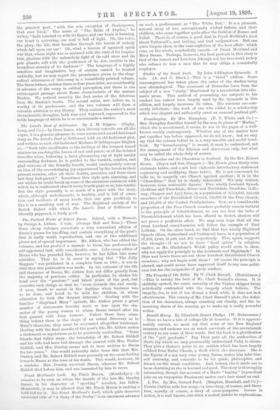Donald Marcy. By Elizabeth Stuart Phelps. (W. Heinemann.) — Here we
have a tale of college life in America. If it is approxi- mately correct, we must say that some of the New England manners and customs are as much survivals of the seventeenth century as are some of their words. But the book is a glorification of the " girl graduate." Fay Fleet puts all the authorities of Harle (by which we may presumably understand Yale) to shame. They give a rhetoric prize to an oration which has been largely cribbed from Rufus Choate, a theft which she discovers. She is the Egeria of a not very wise young Numa, makes him take him- self seriously, and consents to be his guide, philosopher, and friend, on the usual conditions. And, indeed, she is made out te be as charming as she is learned and good. The story is thoroughly interesting, though the account of a Harle " haying " (a practical joke on an unpopular Freshman) makes one's hair stand on end.


































 Previous page
Previous page